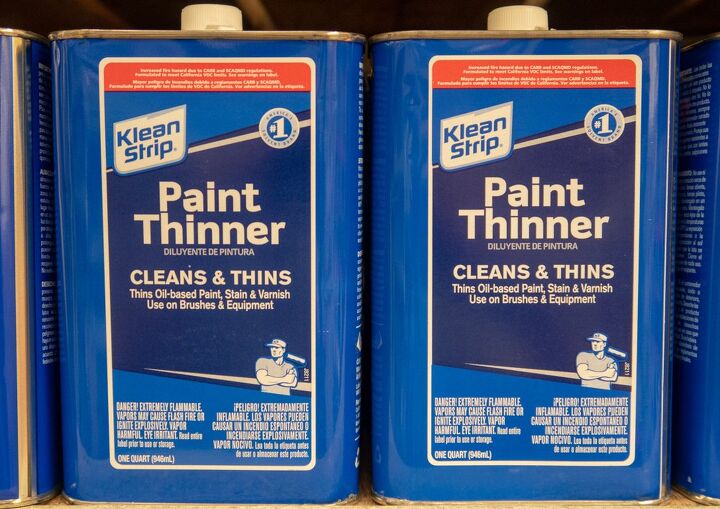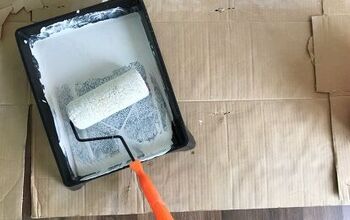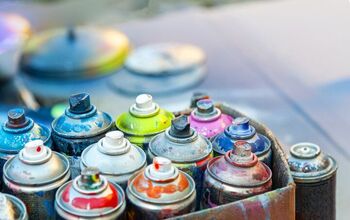Can You Put Paint Thinner In Plastic? (Find Out Now!)

You have to be careful when using paint thinner. That’s because it’s toxic and produces pungent fumes. You can ruin your art supplies with lacquer thinner in the wrong container. So, can you put paint thinner in plastic or not? Here’s your answer.
According to OSHA, you can store paint-thinner in approved plastic containers. However, your everyday vessel from the supermarket might not be durable enough. Over time, strong acetone can deteriorate virtually all materials.
Do You Need to Hire a Paint Contractor?
Get free, zero-commitment quotes from pro contractors near you.

Is Paint Thinner the Same as Acetone?
Paint-thinning liquids are solvents used to cut the oils in paints. They can dilute dried paint and clean equipment containing color. However, paint thinners are highly toxic. And some people confuse them with acetone, which can be dangerous.
Acetone is not the same thing as paint thinner. You can use both chemicals for similar things, but paint thinners offer more applications. For example, you can break down colors with acetone. But you can thin other substances with paint solvents.
You usually see acetone inside plastic bottles at the store. So, can you put paint thinner in plastic containers as well? It all depends on the type of plastic and the strength of the liquid. Heavy-duty paint thinners might destroy commercial materials.
Can You Put Paint Thinner in Plastic Spray Bottles?
Feel free to put your favorite paint thinner in a plastic spray bottle. After all, you can use many commercial plastics for heavy-duty storage. And since paint supplies are costly, cheap plastic containers may help you cut costs. That’s especially crucial on big projects. But that’s not the best idea.
Try to find plastic containers that are compatible with lacquer-thinning products. Otherwise, use glass or metal vessels. High-end, durable storage for paint supplies can be expensive, though. So, use a plastic spray bottle from your local store. Then, try not to leave the substance in your bottle for too long.
Will Paint Thinner Destroy Plastic?
A paint thinner can destroy your plastics if you’re not careful. That’s why it’s a challenge to remove the color from most of your plastic objects. Paint thinners are harsh solvents that can break down the chemical bonds in many synthetic materials. And your plastic spray bottle might be one of them.
DID YOU KNOW: You can look at the symbols on your plastic containers to learn more about the chemical makeup.
What Can You Put Paint Thinner In?
Do not use thin, low-quality plastic containers. Also, stay away from wood vessels for paint thinner. Even finished wood cannot withstand the abrasive power of paint thinner. But you can use one of these materials instead:
- Plastic
- Glass
- Metal
- Silicone
Remember to seal the container to keep dangerous fumes contained. If your vessel remains open, the paint thinner can evaporate into the air. And be sure to store paint thinner away from high temperatures, sparks, and flames because it’s flammable.
TIP: Read the warning label on all your paint supplies to determine which ones are good for storing paint thinner.
Can Paint Thinner Spontaneously Combust?
If you’re not careful with paint thinner, it can cause a spark. That’s because the fumes are flammable, and so are most oil-based paints or stains. Plus, oil paints can produce heat when they start to dry. And having chemicals stored incorrectly nearby is a dangerous cocktail.
Paint thinners, polyurethanes, and varnishes can spontaneously combust if they get too hot. So, keep your art supplies put up where they belong. Then, check the condition of your containers periodically to make sure they’re not damaged or worn.
NOTE: Learn how to put out oil fires and have a safety plan ready when using acetone or other flammable liquids.
Related Questions
Will Paint Thinner Remove Dry Paint?
Paint thinner is a solvent, so it will most likely remove dried paint and varnish. However, that’s not always the case. So, check the label for more information. And always use paint thinner in a well-ventilated space because it produces strong fumes.
What Can I Do with Leftover Paint Thinner?
Don’t throw away your leftover paint thinner yet. You can keep it for later if you reseal the jar. Or pour the unused contents into a new container with an airtight lid. Then return unwanted jars to your local municipal facility or drop them off at a hazardous waste disposal site. Never pour leftover paint thinner in your yard or down the drain.
Is Paint Thinner Flammable?
A paint thinner can catch on fire if you get it too close to heat, sparks, or flames. It also produces odorous fumes that can ignite in the air. So, use acetone and paint-thinning products with extreme caution.
Can You Mix Paint Thinner and Water?
You should be able to mix water into your paint thinner to dilute it. However, no two brands are the same. So, always check the label for detailed instructions and warnings. Then, do what it says regardless of conflicting advice.You can also contact your local hardware store with specific questions. Meanwhile, add a small amount of water to your paint thinner and stir it with a glass or metal rod. And try to use distilled water if you can because mineral water can leave behind mineral deposits.
Do You Need to Hire a Paint Contractor?
Get free, zero-commitment quotes from pro contractors near you.

Protect Your Plastics While You Paint
Related Guides

Tiffany Nichols specializes in aesthetics, design, marketing, and manufacturing. She's a copywriter and editor for several home renovation companies in the U.S. and works alongside some of the biggest names in the industry. Her hobbies include architecture, art, mental health, and fashion.
More by Tiffany Nichols



























